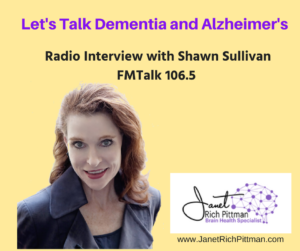Let’s Talk Dementia and Alzheimer’s

Radio FM Talk 1065 Sean Sullivan hosted me to talk bout dementia, Alzheimer’s and ways to increase our brain health to avoid the onset of this disease.
Enjoy listening to our conversation [23 Minutes] (or you can read the transcript below) and let me know if you have any questions.


